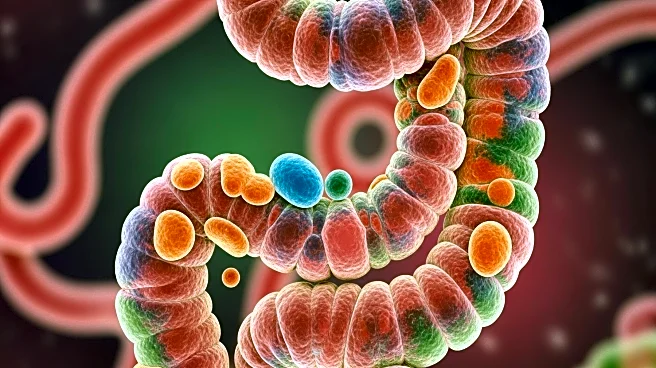What's Happening?
Recent research published in Scientific Reports has uncovered a potential link between gut bacteria and muscle performance. The study involved transplanting gut bacteria from healthy human volunteers into mice, revealing that certain microbes can significantly impact muscle strength and endurance. Two bacterial species, Lactobacillus johnsonii and Limosilactobacillus reuteri, were identified as having a positive effect on muscle growth and recovery. When administered to aging mice, these bacteria improved grip and endurance tests, increased muscle mass, and reduced inflammation markers. The findings suggest that gut health could play a crucial role in athletic performance, highlighting the importance of the microbiome in supporting muscle protein synthesis, improving endurance, and regulating metabolism.
Why It's Important?
The implications of this study are significant for athletes and individuals seeking to enhance physical performance. If the findings translate to humans, gut health could become a key component of training regimens, potentially leading to new dietary strategies that incorporate probiotics to boost muscle strength and recovery. This research underscores the broader impact of the microbiome on health and fitness, suggesting that maintaining a healthy gut could be as important as traditional exercise and nutrition practices. Athletes and fitness enthusiasts may benefit from incorporating gut-friendly foods and probiotics into their diets, potentially gaining an edge in performance and recovery.
What's Next?
While the study's results are promising, further research is needed to confirm the effects of these probiotics in humans. Future studies may explore the specific mechanisms by which gut bacteria influence muscle performance and investigate the potential for probiotic supplements to enhance athletic training. As the scientific community continues to explore the gut-muscle connection, athletes and trainers may begin to consider gut health as a critical factor in developing comprehensive fitness programs. The potential for personalized probiotic regimens tailored to individual microbiomes could revolutionize the approach to sports nutrition and training.
Beyond the Headlines
The study opens up new avenues for understanding the complex relationship between gut health and physical performance. It raises ethical and practical questions about the use of probiotics in sports, including the potential for competitive advantages and the regulation of probiotic supplements. Additionally, the research highlights the importance of a holistic approach to health, where gut health is integrated into broader wellness strategies. As awareness of the microbiome's role in health grows, there may be increased interest in developing gut-focused interventions for various health conditions beyond athletic performance.









